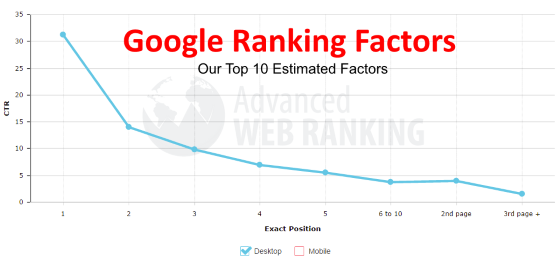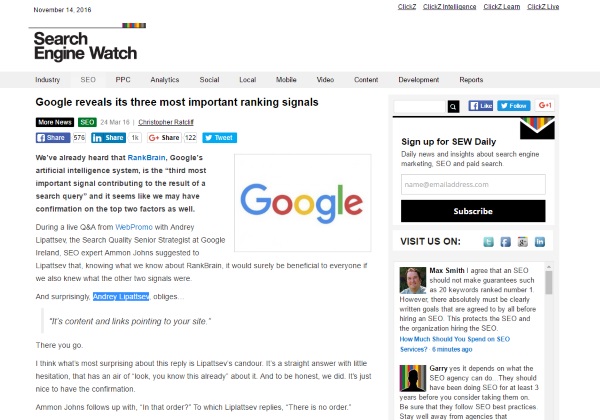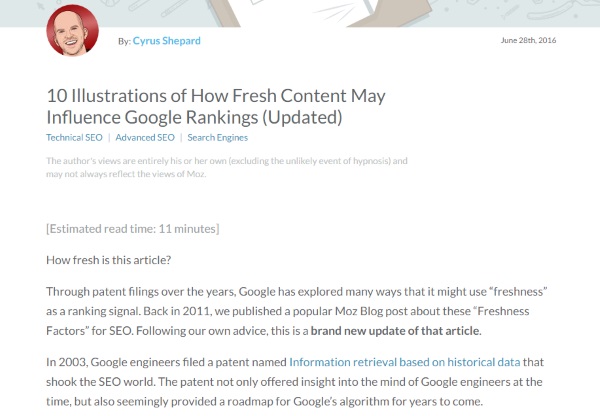Google Ranking Factors - What We Believe To Be The Top 10 Ranking Factors
You could be missing out on up to 62% of your market if you are not ranking well in search engines like Google. How do you rank higher? To do this, you need to know what google looks at to determine which pages rank where. This is hard to know for sure as Google never shares this information directly. We have a pretty good idea, though. We believe the top 10 factors Google uses to determine page rankings in search engine results are content quality, number of total backlinks, RankBrain, click through rate, relevant terms in the content of the page, number of social media shares, domain search visibility, number of referring domains, content freshness, and length of URL. To learn how we came to this conclusion and what data we used, continue reading this article.
Profitworks provides marketing services specializing in Search Engine Optimization, which is one of the highest average ROI marketing mediums available. If you're interested in giving your website a boost to the top of Google, click here to get in contact with us today!
Executive Summary
- You are missing out on 62.36% of your market if you are not ranking on the first page of Google (54.31% for B2C companies)
- You are missing out on 48.2% of your market if you are not ranking in the top 3 positions of Google (41.98% for B2C companies)
- We believe the top 10 rankings factors Google uses to determine search engine rankings are content quality, number of total backlinks, RankBrain, click through rate, relevant terms in the content of the page, number of social media shares, domain search visibility, number of referring domains, content freshness, and length of URL
Sales & Marketing ROI Podcast: Episode #46
Google Ranking Factors. Click the link below to listen to the podcast.
Listen to this podcast- click here
Subscribe our podcast now - click here
View a full listing of our podcasts - click here
Google Ranking Factors
What Google looks at to determine which website pages to show where and for what search phrases is important knowledge for any business. The items Google looks at are what we are referring to as Google Ranking Factors. These factors are important, and on average businesses that don't rank on page #1 of search engine results are missing out on 62.36% of their market. If you are not showing up in those searches you will probably want to look into changing that, and we have outlined everything you need to do in a simple free report. To learn everything you should be doing, download our free report on the 7 key SEO tasks you must do to get more website traffic. If you don't do any SEO work on your website currently I would challenge you to start doing some work or having someone do the work for you this month. SEO on average generates an ROI of approximately $2.75 for every $1 spent, so it is definitely worth doing. Expect 6-12 months thought until you start seeing results and then after that the results and return should even compound over time.
If you don't do any SEO work on your website currently I would challenge you to start doing some work or having someone do the SEO work for you this month. This of this work not as a cost but as an investment that will benefit your business and drive sales many years down the road. If you want to become the leader in your market, you will need market leading SEO. SEO on average generates an ROI of approximately $2.75 for every $1 spent, so it is definitely worth doing. Expect 6-12 months thought until you start seeing results or be able to break even on your costs from it. Then after that the results and return should actually compound over time.

Become The Leader In Your Market
What We Believe The Top 10 Google Ranking Factors Are
Google never tells us exactly what factors they use and how much weight they give to each to determine how they rank pages in search results. Google does give us a lot of hints though through their interviews, the patents they file, videos they issue to the SEO community, algorithm changes they make, and their stated goal to deliver the best content in answer to people's searches. In addition, by watching how different tactics impact page rankings and reading similar studies and reports others have written, we can get a pretty good idea of what is important to Google. This list summarizes what we think are the most important ranking factors Google looks at.
1) Content Quality
It appears from an interview with Andrey Lipattsev from Google, that the #1 ranking factor Google looks at is the quality of the content. We believe this answer to be accurate as we know Google's goal is to provide search results that do the best job of answering people's searches so that Google can gain more users and ad revenue.
How Google determines the quality of content is a little less clear. We believe that they probably use a complex calculation to determine this. Our guess is that it looks at the ratio of text to video and images, the simplicity or the reading level, the ratio of content to white space, and how unique the wording is. This is all speculation, but we know Google is somehow scoring the quality of content and using that score as a top ranking factor.
What we can do make sure we are creating great content. Over time, Google will improve its search algorithms and they will continue to get better at pushing the best content to the top and we will be rewarded, even if the best content is currently not ranking at the top.
2) Number Of Total Backlinks
Again from the same interview with Andrey Lipattsev, we learn that links are the 2nd most important ranking factor Google looks at. Our assumption is that it looks at both the number of total backlinks as well as the number of domains. That is why you see the number of referring domains as ranking factor #8 on our list. We believe that the number of total backlinks and the strength of the pages that the links come from is more important. This assumption lines up with this report we found from openumbrella.org. Doing tasks to create links is definitely one of the most important things you can be doing for your website. To learn everything you should be doing, download our free report on the 7 key SEO tasks you must do to get more website traffic.
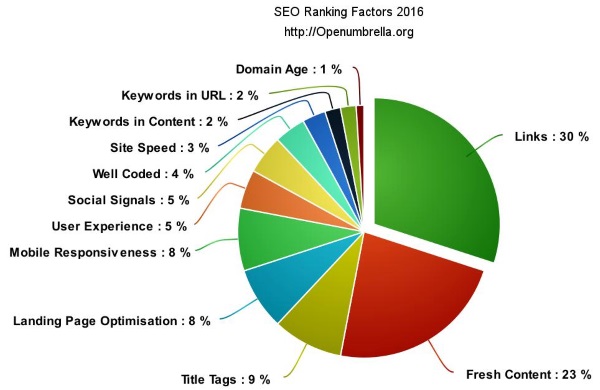
3) RankBrain
Rankbrain is an AI that Google uses to help sort through all of its search results. According to SearchEngineLand, Rankbrain is part of Google's Hummingbird search algorithm and plays an important part in their search ranking results. Again, from the same interview with Andrey Lipattsev, we know that this is the 3rd most important ranking factor. Basically, RankBrain is trying to learn what words have similar meanings and trying to teach itself over time how to improve search results. We believe that this must also be using page interaction metrics like search result click through rate, time on page, and page bounce rate to determine if it is being successful. So what this means is that you need to include multiple words or phrases that mean the same thing as the keyword you are targeting in your content.
4) Click Through Rate
Even though we believe click through rate is taken into account in RankBrain, we still feel it deserves its own position on our list as #4 (the highest factor below the top 3 Google's own employees say are the most important). The reason we rank click through rate so high is that there have been a number of case studies where getting a large number of people to click on a search result that is not near the top can result in that page moving to the #1 position almost instantly. Here is just one such study. As you can see from the report below it is even listed in some reports as being the #1 ranking factor.
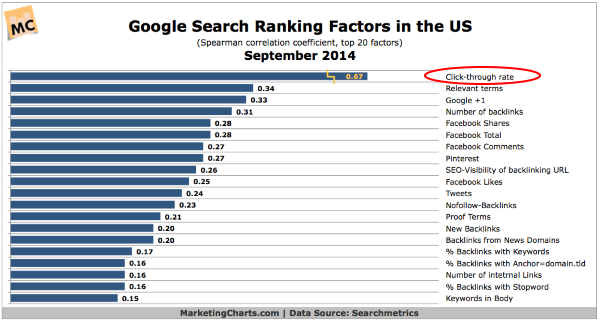
5) Relevant Terms In The Content Of The Page
Next, we tend to see that pages that have many similar terms to the search phrase in the body of the page content tend to rank high in search rankings. For example, if you are trying to rank for auto mechanic, if the page includes a few instances of auto mechanic, a few of auto repair, a few of car repair, a few of car mechanic, a few of car maintenance, etc, the page will rank better than if it does not have these keywords in the content. This theory lines up with the data from the report shown below.
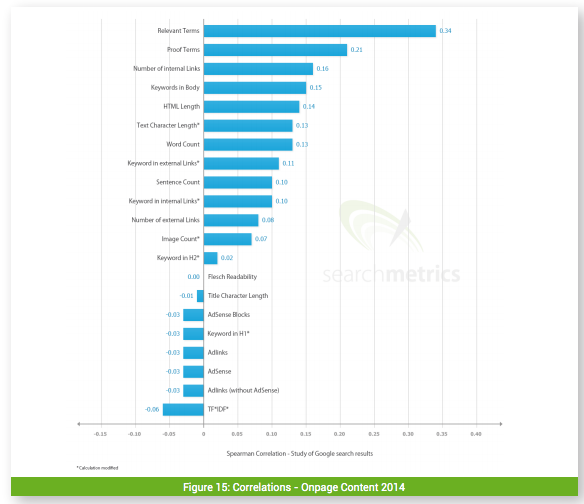
6) Number of Social Media Shares
As you can see from this report by Searchmetrics when you combine all of the social media factors they have a big impact. It makes sense then that Google would look at this. Exactly which platform is the most important is not clear. It is clear though that Google+, Facebook, Pinterest, and Twitter are the only channels that have a big impact. There does not seem to be one channel or one action that has much more weight than the others. Even the action with the highest correlation (Google +) is only slightly higher than the others. Therefore we recommend just focusing on trying to get social media activity for your website of any kind (comments, shares, likes) on the big 4 platforms (Google+, Facebook, Pinterest, and Twitter), in that order.
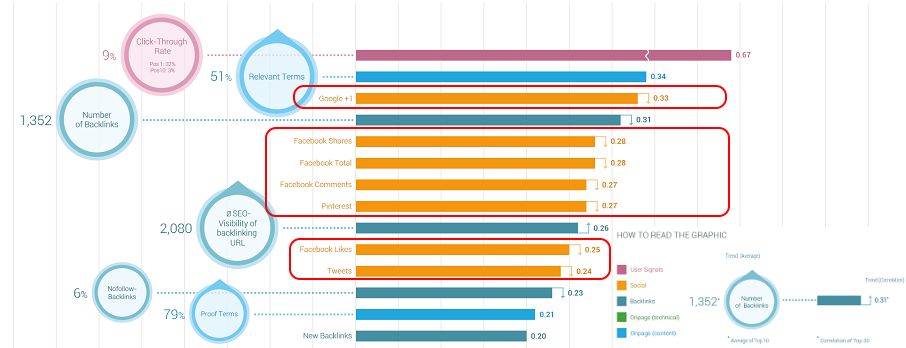
7) Domain Search Visibility (The Number Of Times A Domain Is Shown In Search Results Across All Keywords)
Domain search visibility is how many total times a website comes up in the search results across all keywords in Google. If a website can rank (even on page 6 or 10) for 100,000 searches and another website only ranks for 100 keywords, if the two websites are otherwise equal, it only makes sense Google will rank the page from the first website higher. This means it is helpful to rank for keywords other than your main keywords, as it will push up the rankings of your main keywords. We also assume that Google looks at how high those 100,000 rankings are to determine how much it boosts your rankings. Below is some data that points to the conclusion that this metric is an important factor.

8) Number Of Referring Domains
We think that Google does not just look at the number of backlinks and the quality of those backlinks but that it probably also checks that those links are coming from a wide range of domains. It is easy to get 100 links from 10 websites. It would be much harder to get 100 links from 100 websites. Based on a number of reports like the one below, it appears the number of referring domains does have a high correlation to search rankings. Another interesting report on this can be found here and another here. This matches what we see with our clients. The ones that have a large number of referring domains tend to have an easier job ranking for the keywords they are targeting. Of note from the report below is that it looks like Google gives a high weight to links from news sites, so if you can do anything to get links from a news site, that is a bonus for your SEO efforts.

9) Content Freshness (How Often & Recently The Content On The Page Was Updated)
In our experience updating content has had a positive impact on search results. In addition, we have seen a number of articles report similar results, but the coverage on this topic is very thin. If there is one factor on the list we are least confident about, it is this one. We do think that it makes sense for Google to show content that is regularly updated/improved over content that is not. So even if it is not an important ranking factor now it could become more important in the future. Below is a great article that talks about why Google most likely looks at content freshness and how it probably scores it.
10) Length Of The URL
We tend to see that if the URL is very long, the page has a hard time ranking. Conversely, if we can find a way to make the URL nice and short we find that we can get the page to rank much higher. An example of this would be a URL like http://www.autowebsite.com/tips/2016/02/18/what-does-it-mean-when-the-cruise-control-is-not-working-and-how-to-fix-it would not rank as well as a URL like http://www.autowebsite.com/cruise-control-how-to-fix. This conclusion matches with the data found it the report below. The strength of this impact, though, in our opinion, is lower than any of the above 9 factors.
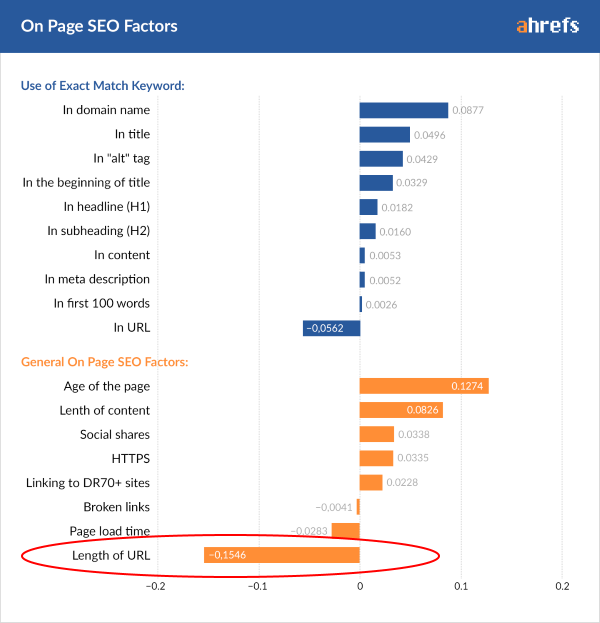
Other Google Ranking Factors
There are believed to be over 200 ranking factors that Google looks at to determine the position of each page it displays in its search results. This is the best article we found that lists as many of those 200 rankings factors.
http://backlinko.com/google-ranking-factors
We only covered the top 10 in this list as we believe these 10 account for the lions share of what Google looks at and therefore are the 10 companies should focus on. We estimate that the factors not included in our list of ten most likely account for less than a 30% weighting.
Other Articles About Google Ranking Factors
Here is a list of other articles we have written on this topic
Google Ranking Factors - #1 Is Content
How Google's Algorithm Updates Impact Your Website Rankings
Projected Future Google Ranking Factors
Here is a report we found that we thought was also interesting and relevant to this discussion. It outlines what ranking factors the majority of SEO experts think will increase in importance in the near future.
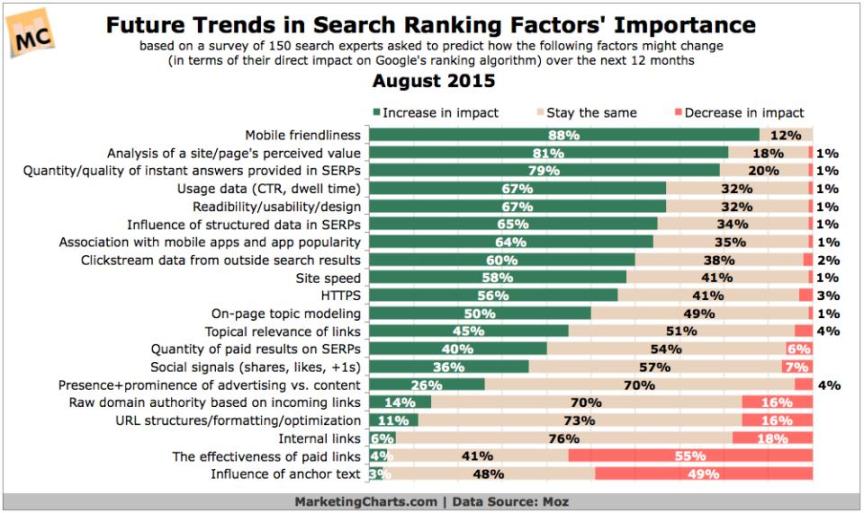
How We Got That You Are Missing Out On 62.36% Of Your Market
93% of B2B buyers start with an internet search (source)
81% of B2C buyers conduct online research before buying (source)
94% of clicks are organic; paid advertising clicks account for only 6% (source)
55.13% of clicks are the first 3 organic positions (source)
71.33% of clicks are the first page (source)
B2B Calculation
First Page = 93% x 94% x 71.33% = 62.36%
First 3 results = 93% x 94% x 55.13% = 48.2%
B2C Calculation
First Page = 81% x 94% x 71.33% = 54.31%
First 3 results = 81% x 94% x 55.13% = 41.98%
Resources That Helped Us Come Up With Our Top 10 Google Rankings Factors List
We came up with this list using the following resources:
- The experiences of what we have seen with our own website rankings
- The experiences of what we have seen with the website rankings of our clients
- https://searchenginewatch.com/2016/12/13/6-seo-experiments-that-will-blow-your-mind/
- The 2015 Search Metrics Ranking Factors Report
- The 2014 Search Metrics Ranking Factors Report
- The September 2014 Marketing Data Ranking Factor Chart
- The on page factors report from ahrefs
- The Search Metrics Figure 15: Correlations - Onpage Content 2014
- The Backlinko Backlinko Search Result Study
Free Report - The 7 Key SEO Tasks You Must Do To Increase Website Traffic
Do you feel you should have more traffic to your website but you don't? Download our free report to learn 7 tasks to increase traffic to your website that anyone can do. The report outlines the 7 tasks in easy to understand language. The report includes the 7 tasks, an explanation of why SEO is important, what affects SEO rankings, and an explanation of the difference between SEO and paid search engine advertising and why SEO is better than paid search engine advertising. To learn more about SEO in general, read our SEO 101 article.
Profitworks Small Business Services provides email marketing, website traffic, and website conversion optimization services which increase the number of sales generated from a website. The focus of our services is on increasing sales and providing a positive return on investment. Or in the words of one of our customers "Our overall sales to new customers has improved as a result of detailed analysis, proposed solutions and successful execution." To learn more about Profitworks, click here.
Other Articles You Might Be Interested In
 |
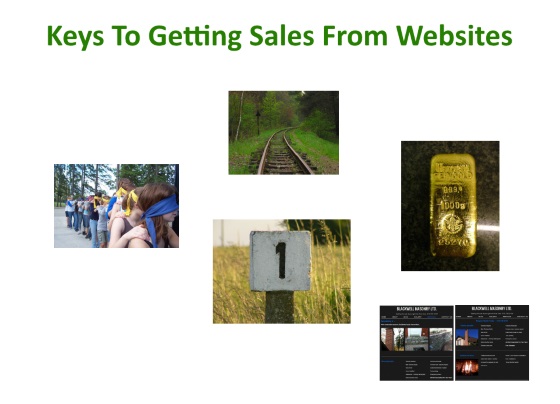 |
 |
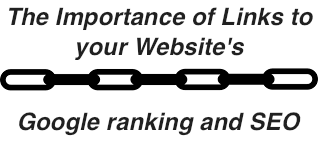 |
|---|
